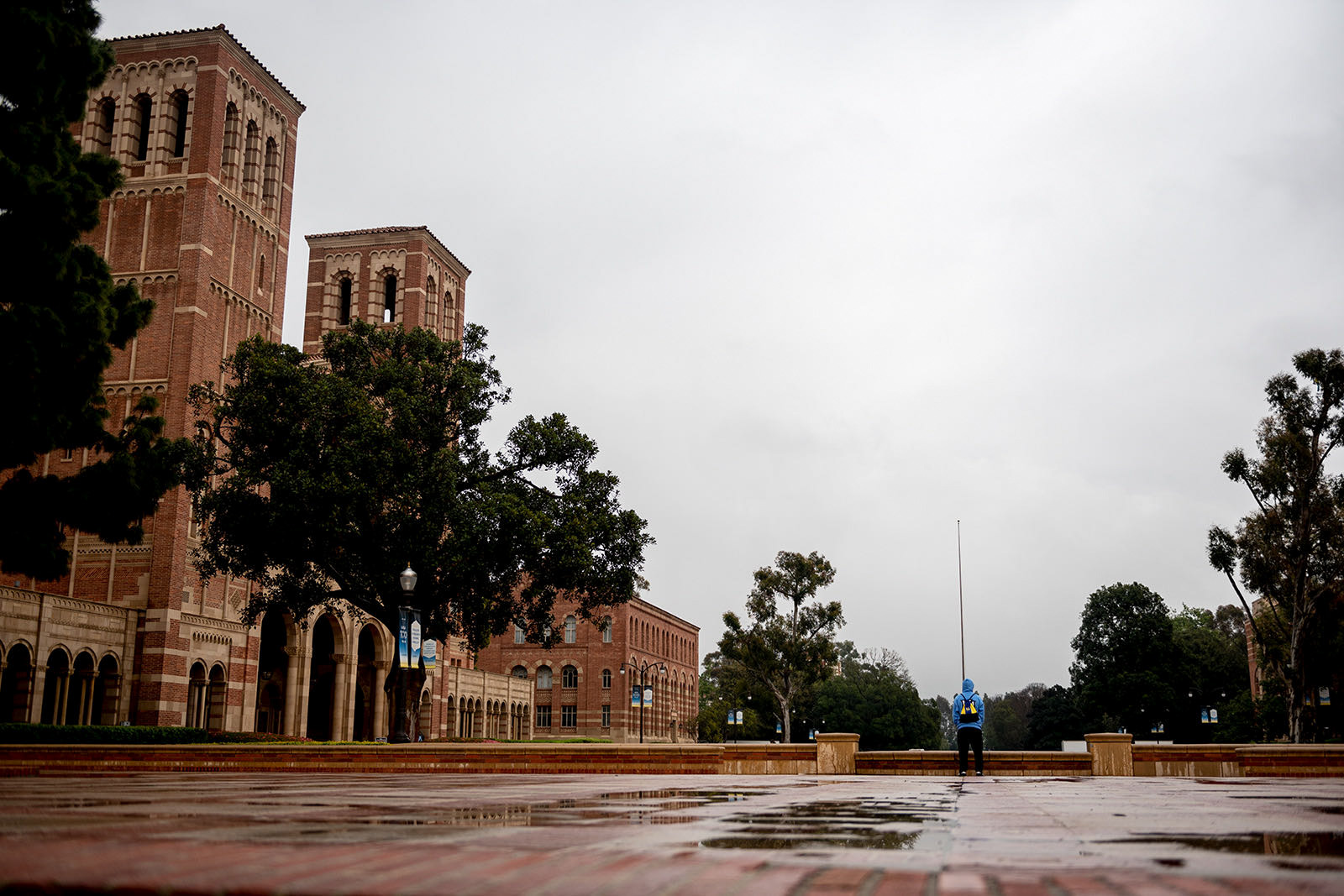Op-ed: Administration must work with students to mitigate impacts of COVID-19

The University of California’s response to the novel coronavirus lacked communication with student government leaders on swift campuswide responses. These discussions remain necessary to protect vulnerable students from footing the cost of long-term tuition changes. (Niveda Tennety/Assistant Photo editor)
By Aidan Arasasingham
March 16, 2020 9:11 p.m.
The global spread of the novel coronavirus COVID-19 has forced universities nationwide to take unprecedented steps, with many suspending in-person instruction and some even forcing students out of on-campus housing.
Across the UC, COVID-19 responses have been swift. Campuses throughout the state have taken steps to move instruction online for the remainder of the academic year. Absent from this swift and necessary response, though, has been a clear lines of two-way communication between administration and student leaders.
In the midst of this pandemic, during which drastic steps must be taken by the University of California to protect public health, students cannot be left out of the decision-making process. And most importantly, students cannot be left footing the bill for the long-term impacts of these decisions about their food, housing, health and financial security.
At UCLA, student leaders on the Undergraduate Students Association Council expressed frustration over a lack of meaningful consultation in the March 10 decision and rollout of UCLA’s suspension of in-person classes until April 10. An absence of continued updates and consultation led to a flurry of rumors and misinformation in the leadup to the decision to suspend in-person classes for the remainder of spring quarter.
UC-wide, campus-driven decisions have led to a lack of coordinated responses across all nine campuses. This has left statewide student leaders at the UC Student Association out of the loop on crucial decisions affecting students.
Elsewhere, unforeseen consequences for students’ basic needs are coming as a result of inadequate student representation in COVID-19 decision-making.
At Harvard University, students were told they had five days to either vacate university housing or face eviction. Absent from this directive was any concern for whether students had the financial resources to go home, or even if they had homes to go back to. As a result, students have had to improvise and crowdfund for essential basic-needs resources.
Harvard’s actions, which have also happened at Ohio State and Pomona College, present a case study in what not to do. This kind of haphazard response cannot happen at the UC. The University has the opportunity to cultivate national leadership in response.
Because in the short-term rush to action, long-term impacts to student basic needs can’t be left out. Student input in these vital decisions can mitigate those impacts.
To the UC’s credit, it has had perhaps one of the most thoughtful responses to COVID-19. At UCLA and its sister schools, campus leaders have committed to keeping on-campus housing and dining operations open for students, while offering students who opt to leave campus prorated refunds. UC schools are also working proactively with their international students to address visa challenges during this uncertain time.
But more can be done.
For students living in off-campus apartments wishing to move home, UCLA’s Student Legal Services should provide help to students wishing to renegotiate their leases. And should an emergency ban on evictions be passed by the Los Angeles City Council shortly, UCLA should offer pro bono legal services to students should landlords violate this ban.
Student workers and teaching assistants should be granted increased flexibility as they weigh remaining on campus. For student jobs that cannot be done remotely, student workers should be guaranteed paid administrative leave. And for students that rely on off-campus jobs to make ends meet, UCLA should provide streamlined access to emergency loans or cost-of-attendance adjustments for them in the event of downsizing.
Especially in a global pandemic, continued access to health care is essential. Students with UC Student Health Insurance Plan should be made aware of telehealth options, the presence of UC Health in their own communities or reciprocal out-of-state network health benefits. Students relying on mental health counseling from Counseling and Psychological Services should be guaranteed online continuity of care. And given the breakthrough of UC developing its own in-house COVID-19 test, students should receive access to free testing should their doctors recommend testing.
As students navigate the difficult transition toward an online learning environment, UCLA must also provide or connect students with subsidies for computer hardware, software and internet for students without home access. Greater flexibility for payment extensions will also ease the burden on students and families during this crisis.
Certain UC campuses have committed to only a couple of these common-sense solutions. But none, including UCLA, have committed to all. And the lack of consistent commitments systemwide means UC students face uneven and unequal benefits during this crisis.
Amid all this is the looming specter of a multi-year tuition increase at Thursday’s Board of Regents meeting, which is continuing largely in-person despite an executive order from Gov. Gavin Newsom on social distancing.
Regents will be voting on a cohort-based plan of yearly tuition increases that would see fall’s incoming class pay an additional $606 if they are in-state students.
At a moment of unprecedented uncertainty for students and their families as a result of COVID-19, the university cannot charge another massive bill on the backs of students.
The novel coronavirus will reshape all of our lives for several months. In order to address its vast impacts on campus life, the administration and students must work together in partnership to mitigate unforeseen impacts.
With time, the UC community will get through this. But it’s naive to think this crisis won’t hit the most vulnerable student populations the hardest.
And the only way to move beyond this crisis in a truly equitable fashion is if all campus leaders – administrative, faculty, staff and student – work closely together with a focus on those most marginalized.
Aidan Arasasingham is a third-year global studies student and the Government Relations Chair for the UC Student Association.

